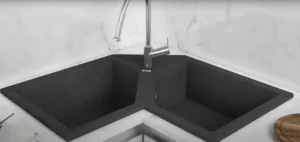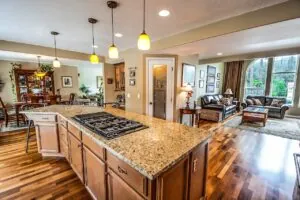Choosing the right worktop for your kitchen can be tough. There are many materials available, each with its own benefits. This article will guide you through nine different types of countertop surfaces, from granite to laminate and stainless steel.
Find your perfect match here!
Key Takeaways
- Quartz countertops are made from a mix of crushed stone and resins, making them highly durable and resistant to stains. They require little maintenance and come in a variety of colors.
- Granite is incredibly tough, resisting scratches and heat, making it ideal for busy kitchens. It offers a unique look since each slab has its own pattern.
- Marble countertops add luxury to any kitchen but need careful handling due to their susceptibility to scratches and etching.
- Soapstone provides a soft texture that’s comfortable under the hands. It doesn’t stain or require sealing, appealing to those seeking low-maintenance options.
- Solid surface materials like Dekton resist both scratches and heat, combining the qualities of porcelain tiles, glass surfaces, and quartz into one robust countertop option.
- Butcher block counters offer warmth with their natural wood appearance but need regular oiling to maintain their condition.
- Reclaimed wood countertops highlight environmental consciousness by reusing old lumber, adding unique history and character to the kitchen space.
- Laminate countertops present an affordable yet durable choice for budget-conscious renovators wanting various design options without high costs.
- Ceramic tile gives endless customization in design at an affordable price point; however, it requires specific care instructions for maintenance over time.
- Stainless steel tops excel in durability against heat damage or scratches; their non-porous surface makes them easy to keep clean
Quartz Countertops
Quartz countertops blend natural minerals and high-tech resins into a tough kitchen surface. They resist stains, withstand heat, and add sparkle to any cabinetry with their polished finish.
Composition and features
Quartz countertops stand out for their unique make-up. They blend 90% crushed stone like granite, marble, or other natural stones with recycled materials such as ceramic, silica, glass, and mirrors.
This mixture gets bound together with a sturdy binder to create engineered quartz. Unlike natural stone countertops that are cut from pure granite or marble, quartz counters are crafted from these mixed materials.
This process results in a durable surface suited for kitchen counters.
Quartz combines the beauty of stone with enhanced durability.
Thanks to its engineered nature, quartz offers more variety in colors and designs than many natural stone options. The non-porous quality of quartz makes it resistant to staining and prevents bacteria growth.
Homeowners appreciate how little maintenance it requires while still offering the elegant appearance of natural stone like soapstone or marble countertops but with added resilience against damage and wear from daily use in bustling kitchens.
Choosing a quartz countertop means getting a strong yet flexible surface capable of resisting impacts better than most solid surfaces or natural-stone counterparts. Its resistance to heat adds another layer of functionality for those passionate about cooking and baking, ensuring longevity even under frequent high-temperature exposure next to stoves or ovens.
Pros and cons
Choosing the right countertop material for your home can feel overwhelming. With so many options available, it’s crucial to weigh the advantages and disadvantages of each to find the perfect match for your lifestyle and budget. Let’s explore the pros and cons of quartz countertops, which are a popular choice for many homeowners seeking to upgrade their kitchen or bathroom.
| Pros of Quartz Countertops | Cons of Quartz Countertops |
| Incredibly durable and easy to maintain | One of the highest price tags among countertop materials |
| Customizable, with a wide range of colors and patterns | Not as heat resistant as concrete, tile, or crushed glass |
| Stain resistant and easy to clean | Price can range between $40 to $100 per square foot |
| Seen as alternatives to granite or marble, offering durability | The high price is due to durability, appearance, and stain resistance |
From my own experience, the investment in quartz countertops was worth every penny. Despite the upfront cost, the ease of cleaning and the durability of the material have saved me from headaches over stains or damage. The variety of designs also allowed me to find a style that perfectly matched my home’s aesthetic. Choosing quartz was one of the best decisions for my kitchen renovation project, emphasizing the importance of considering both the pros and cons before making a final decision.
Natural Stone Countertops
Natural stone countertops bring the outdoors inside your kitchen. They offer a slice of earth’s pure elegance right atop your kitchen cabinets.
Granite
Granite countertops bring natural beauty to your kitchen remodel that no man-made material can match. This rock forms deep in the Earth, making each piece a unique artwork of minerals.
Because granite scores between 6 and 8 on Moh’s Scale of Mineral Hardness, it stands up well to daily use. Knives and keys don’t easily scratch it, and hot pots won’t leave marks, showcasing its impressive heat resistance.
Families love this low-maintenance option since it doesn’t etch or stain easily when sealed properly.
Installing granite in my own kitchen brought an unexpected perk; visitors often comment on its stunning patterns and how they add character to the space. Each slab possesses its own palette of colors and textures, meaning your countertop will be one-of-a-kind.
And while some worry about maintenance, I’ve found keeping my granite countertop looking new is as simple as wiping spills quickly and using a stone cleaner occasionally.
Choosing granite was more than just picking a countertop; it was bringing a piece of nature into our home.
Marble
Marble stands out as a symbol of luxury and elegance on kitchen countertops. Its beauty fits perfectly into high-end kitchens, offering a touch of class that few materials can match.
Available in various colors and patterns, marble adds unique character to any space it graces. Unlike more common countertop materials like laminate or ceramic tile, marble brings an unmatched level of sophistication.
Despite its stunning appearance, marble requires careful consideration due to its less durable nature compared to granite or engineered stone countertops like quartz. It’s prone to scratches and etching from acidic substances; therefore, families must treat it with care.
The cost is another factor to weigh since marble ranks among the most expensive options for countertops.
Choosing marble means embracing its patina over time, accepting that the signs of daily life will become part of its charm. For those ready to invest in their home’s resale value while indulging in beauty, marble remains a captivating choice that promises to elevate the kitchen’s design markedly.
Soapstone
Soapstone, known for its soft touch due to high talc content, stands out among natural stone countertop options. Unlike granite or marble, this material provides a unique feel and aesthetic appeal.
Crafted from steatite stone, which blends dolomite, magnesite, and chlorite, soapstone offers a soothing texture that’s gentle on the hands. Its uniqueness draws more homeowners to choose it for their kitchens and bathrooms.
This material not only adds character but also brings practical advantages. Soapstone countertops are highly durable and resistant to stains, making them ideal for busy kitchens. Due to its dense composition, it naturally repels liquids and doesn’t require sealing like granite or marble countertops do.
My own experience with a soapstone countertop has been nothing short of impressive—spills clean up easily without leaving any marks.
Choosing soapstone allows for creativity in design with various cuts and edges that can tailor to personal style preferences. Whether used as kitchen counters or bathroom vanities, they seamlessly integrate into any decor style while offering lasting beauty and functionality.
Solid Surface Countertops
Solid surface countertops blend beauty with practicality. These counters resist scratches and make cleaning easy.
Dekton
Dekton combines the best qualities of porcelain tiles, glass surfaces, and quartz countertops into one solid surface countertop. This mixture makes it highly resistant to stains, scratches, and heat.
It’s so tough that you don’t have to worry about damaging it with hot pans or spilled coffee. Homeowners love Dekton because it comes in a wide range of colors, fitting any style from modern kitchens to outdoor patios.
The material is known for its “Sinterized” process, blending raw materials under high pressure and heat to create a durable slab.
Dekton offers maintenance-free beauty that stands up against heat and scratches effortlessly.
From personal experience renovating our kitchen, we chose Dekton over other materials like granite or laminate countertops due to its unbeatable durability and low maintenance needs.
Cleaning is a breeze; just a simple wipe down keeps it looking new. Another major plus is its non-combustible nature which adds an extra layer of safety for indoor spaces. Whether you’re chopping vegetables directly on the surface or setting down a scorching pot, Dekton handles it all without showing any wear.
Other Types of Countertop Materials
Exploring countertop options extends beyond common choices. Discover materials like butcher block for a warm kitchen feel, or stainless steel for a sleek touch.
Butcher Block
Butcher block countertops bring a cozy and natural touch to any kitchen. Made from strips of wood glued together, these surfaces are thick and durable. They stand out for their warmth and inviting look, making them a popular choice among homeowners seeking to add character to their cooking spaces.
The unique feature of butcher blocks is their dual purpose; they can double as cutting boards, offering a solid surface for meal prep.
Affordability is another key advantage of butcher block countertops. With material costs ranging between $20 and $60 per square foot, they present an economical option without compromising on style or functionality.
Yet, owning a butcher block countertop means committing to its upkeep. These wooden surfaces need regular oiling to maintain their condition and extend their lifespan. This ongoing maintenance ensures that the natural beauty of the wood remains intact and resistant to wear over time.
Crafting these countertops involves selecting types of wood like maple or teak that are known for their scratch resistance and durability. The intricate assembly process highlights the distinct knots and grain patterns in the wood, contributing to each countertop’s unique appeal.
For those who love DIY projects or wish to customize their kitchen’s appearance, butcher block allows for personalized touches such as choosing sealed vs unsealed finishes or customizing the edges according to preference.
Reclaimed Wood
Reclaimed wood brings history into your home. This material comes from old buildings and structures, giving new life to what once was. Choosing reclaimed wood for countertops shows a commitment to the environment by reducing the need for new trees.
Each piece tells a story, making your kitchen unique.
Using this wood, people find not just beauty but also sustainability in their homes. It’s eco-friendly, keeping with green building trends. The character found in each plank of reclaimed wood can’t be replicated in fresh lumber or other countertop materials like concrete or high-pressure laminates.
My own experience has shown that guests always ask about it, drawn to its warmth and texture that adds so much more than just a surface to work on.
Laminate
Laminate countertops have become a top pick for upgrading kitchens on a budget. These surfaces are not only affordable but also boast durability that rivals more expensive options like granite and marble.
You can find them in various designs, making it easy to match your kitchen’s style without breaking the bank. Top brands offer an array of colors and patterns, from classic looks to modern aesthetics, ensuring there’s something for every home.
From personal experience, installing laminate was a breeze, transforming the kitchen without much hassle or expense. Its ease of maintenance is another plus; spills clean up quickly with just a damp cloth.
Over time, I’ve noticed how well my laminate counters have held up against daily wear and tear, proving their worth beyond just their initial affordability and attractive appearance.
Homeowners looking for stylish yet practical countertop solutions should definitely consider this versatile material.
Ceramic Tile
Ceramic tile countertops bring endless designs, colors, and textures to your kitchen. Their cost starts at a friendly $1 per square foot, making them an affordable choice for any home upgrade.
You can pick from simple porcelain tiles or go for elaborate hand-painted ones that add personal flair. Ceramic tiles stand up well to daily use, proving themselves durable enough for busy kitchens.
Choosing ceramic tiles means you have the freedom to customize every inch of your countertop space. I decided on a mix of mass-produced and unique tiles for my kitchen overhaul. This combination allowed me to stay within budget while injecting personality into the design.
The selection process introduced me to various finishes and care instructions vital for maintaining their look over time.
Opting for ceramic tile is not just about saving money; it’s also about embracing creativity in your home renovation project. With prices ranging widely based on style and quality, there’s room to play around until you find the perfect match—whether that’s sticking with a solid-surface material vibe or experimenting with different patterns and hues.
Stainless Steel
Stainless steel takes the crown as the top metal choice for countertops in kitchens. Its fame comes from being tougher than its rivals, copper, pewter, and zinc. People who have stainless steel surfaces say goodbye to worries about heat damage or scratches.
This resilience makes it a champion in homes where cooking is akin to an art form.
Choosing stainless steel means investing more upfront compared to other materials like wood countertops or concrete countertops. Yet, many find this cost worthwhile for its blend of functionality and sleek design.
Kitchens shine with a modern look that’s easy to keep clean and stunningly durable.
Families upgrading their spaces often weigh options between sealed vs unsealed surfaces. With stainless steel, such stress fades away due to its naturally non-porous nature—making it a low-maintenance dream for busy households.
Its ability not just to survive but thrive under kitchen chaos—from hot pans placed directly on the surface without harm—to resisting nicks and cuts, places it at the heart of practical kitchen design choices.
Concrete
Concrete countertops offer a unique blend of customizability and style, making them a standout choice for any home renovation. You can pick your color, texture, and even the shape to match your kitchen’s design perfectly.
Imagine creating a countertop that not only fits your space like a glove but also reflects your personal style down to the last detail.
Having installed concrete countertops in my own home, I appreciate their ability to blend seamlessly with other organic materials such as wood and metals. This harmonious mix adds a warm, inviting vibe to my kitchen while maintaining that sleek, modern edge.
On top of their aesthetic appeal, these countertops come with their own set of benefits and drawbacks compared to materials like quartz or granite. For those looking into options beyond stainless steel or sealed vs unsealed surfaces, concrete presents an intriguing alternative worth considering for its versatility and design potential.
Conclusion
Choosing the right material for your kitchen counter brings both style and function to your home. From quartz that resists heat well to natural stones like granite that add elegance, each option has its unique advantages.
Wood options like butcher block bring warmth, while metals such as stainless steel offer durability against heat and germs. Materials like poured concrete give a modern vibe, whereas ceramic offers endless customization.
Think about what matters most in your kitchen to make the best choice for your space. Have a hard time choosing? Contact Elevare Kitchen and Bath today for professional advice.
FAQs
1. What are the benefits of stainless steel countertops?
Stainless steel countertops stand out for their durability and ease of cleaning. They resist heat and stains, making them a top choice for busy kitchens.
2. Can glass countertops add style to my kitchen?
Yes, glass countertops can bring a modern look to any kitchen with their sleek design and wide range of colors. They’re also quite sturdy when sealed properly.
3. What should I know about choosing between sealed vs unsealed countertop materials?
Sealed countertops offer protection against spills and stains, making them easier to maintain, while unsealed ones can absorb liquids and require more care but may have a more natural or unique appearance.
4. How do I decide on the right edge for my countertop?
Countertop edges can change the feel of your kitchen or bathroom significantly. Choices range from simple designs like squared edges to more detailed options such as bullnose or ogee, depending on your style preference and safety considerations.





